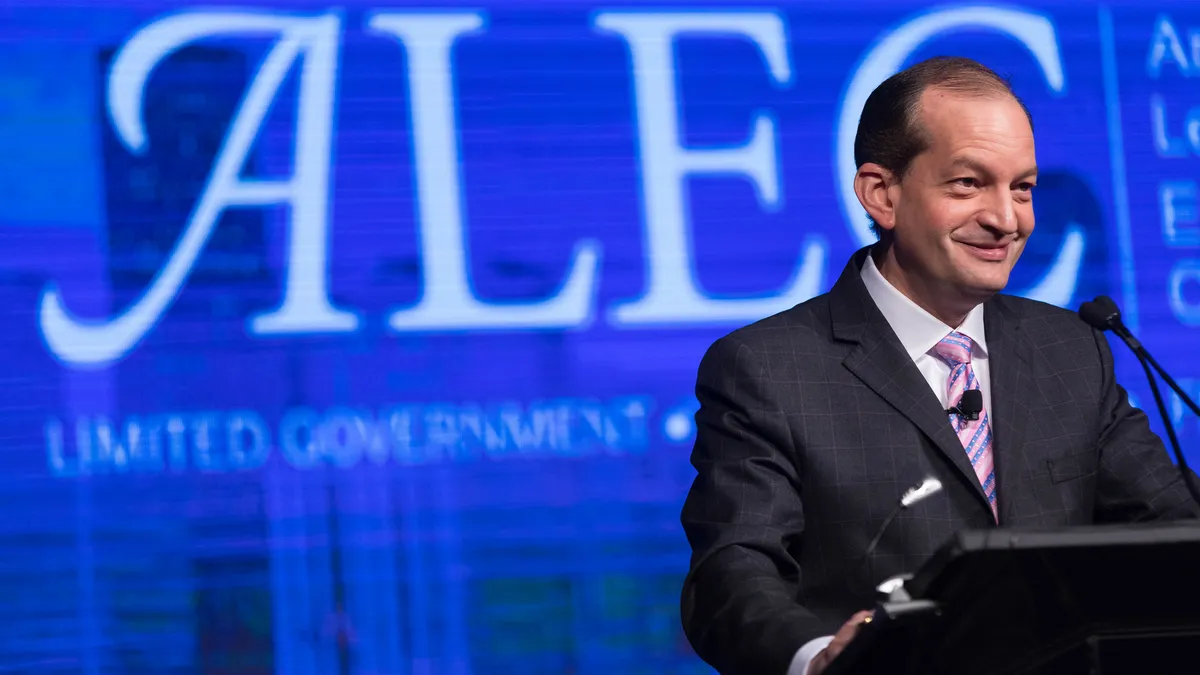Dive Brief:
- A plea agreement struck in a 2008 sex trafficking case by U.S. prosecutors, including current U.S. Labor Secretary Alexander Acosta, violated the rights of victims in the case under the Crime Victims' Rights Act (CVRA), a judge in the U.S. District Court for the Southern District of Florida ruled Thursday (Jane Doe 1 and Jane Doe 2 v. United States, No. 08-80736 (S.D. Fla. Feb. 21, 2019)).
- Judge Kenneth Marra said in the ruling it was "undisputed" that the U.S. government had entered into a non-prosecution agreement (NPA) with sex offender Jeffrey Epstein without conferring with the petitioners, who are alleged victims of Epstein, during the negotiation and signing of the agreement. "Instead, the Government sent letters to the victims requesting their 'patience' with the investigation even after the Government entered into the NPA," Marra wrote. "At a bare minimum, the CVRA required the Government to inform Petitioners that it intended to enter into an agreement not to prosecute Epstein."
- Marra granted the petitioners' motion for partial summary judgment on the question of whether their right to a conferral under CVRA was violated. The ruling led to calls by a group of Congressional Democrats for Acosta, who approved the NPA as the U.S. Attorney for Florida's Southern District, to resign. That group includes Rep. Jackie Speier, D-Calif., who cited in a statement Acosta's "severe mishandling" of the case. "We strongly believe that Secretary Acosta was negligent in his duty to represent the best interests of the victims and the U.S. Government," the statement said, quoting a letter from the group to President Donald Trump. "As such, we request that you immediately demand his letter of resignation."
Dive Insight:
Questions about Acosta's handling of the case originally arose in the wake of an investigative report by The Miami Herald in late 2018, which publicized aspects of the NPA and led to initial calls for an investigation. A Feb. 6 letter to Sen. Ben Sasse, R-Neb., from the U.S. Department of Justice (DOJ) said the agency's Office of Professional Responsibility would open an investigation into allegations that DOJ attorneys "committed professional misconduct in the manner in which the Epstein criminal matter was resolved."
Court documents show Acosta played a large role in the negotiation of the plea deal with Epstein. Highlights from Marra's opinion include excerpts from an email between Epstein attorney Jay Lefkowitz and Acosta, in which the former advised that the victims' attorney representative be told: '"[t]he details regarding the United States's investigation of this matter and its resolution with Mr. Epstein is confidential. You may not make public statements regarding this matter.'" Another issued raised by the Herald's investigation was that the NPA had been sealed so victims could not see it.
It's unclear what the outcome of ongoing investigations, or the repercussions for Acosta, may be. Trump, when asked about Marra's ruling by reporters Friday, didn't address it at length. "I don't know much about it," Trump said. "That seems like a long time ago, but I know he's been a fantastic Labor Secretary." However, White House Press Secretary Sarah Sanders told reporters on the same day that the Epstein case is "certainly something we're looking into," NBC News reported.
"For more than a decade, the actions of the office in this case have been defended by the Department of Justice in litigation across three administrations and several attorneys general," a U.S. Department of Labor spokesperson said in a statement to Politico. "The office's decisions were approved by departmental leadership and followed departmental procedures."
Acosta has defended the government's actions in the Epstein case, calling the plea agreement "a good thing." When questioned about his role during a confirmation hearing by Sen. Tim Kaine, D-Va., Acosta described the confidential aspect of the agreement as having been less controversial at the time it was struck. "A very positive outcome can become a negative outcome not because of a change in the underlying substance, but because by something not looking public, it is looked at with suspicion," he said.














